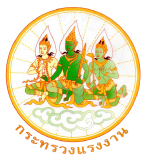On 3 March 2017, Deputy Permanent Secretary of Labour Mr. Boonlert Teeratrakul chaired the commencement of the short-term curriculum on vehicle parts production, aimed to develop talent entering the workforce to support the growing automotive industry. Thailand is aimed to be the automotive production hub and leader in ASEAN, where the government has identified the industry as one of ten industries of the new engine of growth. The automotive parts and other industries have felt a shortage in labour, both in terms of quantity and quality. The Department of Skills Development has acted through the establishment of an Automotive Human Resource Development Academy (AHRDA) within the Samut Prakarn Skills Development Institute Area 1. The AHRDA is designed to be the leader in training talent in the automotive industry towards a Thailand 4.0, which will set the foundations for human resource development towards a “Brain Power” workforce in 20 years, in alignment with the Ministry of Labour’s strategies.
Mr. Boonlert continued, saying that the AHRDA had joined with the subcommittee on private and public collaboration for the production and development of vocational students in arranging training to 63 students from Chachoengsao Technical College, Nakhon Nayok Technical College, and Chon Buri Technical College. The participating students study in a tripartite system in automobile parts production which requires 1-year of studies in a technical college and 1-year of training in an organization. The system allows students to gain hands-on experience, thus were sent to train at the AHRDA for the “short-term curriculum on automobile parts production” under the “collaboration project to develop personnel in the automotive parts industry” which will take 120 hours. The syllabus touches on 5 theoretical courses including the use of the NX cam For Milling Operation, industrial skills, basic electronics, MAG welding for vehicles and SQCD.
“The AHRDA is a model for strong collaboration between the private and public sectors. Apart from the stated training for students, there is planning, evaluations and formulation of skill standards, coupled with 40 curriculums which emphasize training for management to super blue collar workers, to general staff. It also aims to push trainers in private institutes to use the standard skills to create an aligned syllabus; this will be an ideal model to extend to other areas in the future,” said Mr. Boonlert.
——————————
Bureau of Public Relations/
Sompob Silbut News & Photos/
3 March 2017




